When reading about mothers and daughters, we might feel grateful we didn't have to endure such conflict and trauma. We might long for what we, ourselves, never had. But then again, we might feel seen. More often, literature reflects troubling, toxic, or estranged mother-daughter relationships than they do healthy, positive, even inspiring ones. Many works of literary prose—novels, essay collections, memoirs—portray relationships between mothers and daughters who embrace the complexity of their respective identities and personalities, of their own and of their mothers/daughters.
One year, I gave my mother Amy Tan's The Joy Luck Club in hopes that the novel would speak for me, say what I couldn't say—I could understand you better if I knew you more, if I knew what you went through, before me. I remember watching Terms of Endearment, the film adaptation of Larry McMurtry's novel, in the 1980s every time it came on cable, identifying with Emma's longing to escape her my mother's insistences, too young to understand that the conflicts between she and her mother would always leave Emma missing her mother when she was miles and states away, the cords of their landline phones a tether.
When my mother died in 2018, my grief was compounded by how much I didn't know about my mother, of my mother, and when I had a daughter in 2002, I knew I wanted my daughter to know me, the girl I had been, the young woman I missed, yet often regretted, and the woman I am, as me, as Jill, the woman beyond her mother.
I dedicate the books I write to my daughter, Indie, as an extension of this desire for her to know me, and to know how I saw and see us. I consider them a record—an artifact even. In 2019-2020, as Indie's senior year of high school began, I wanted to catalog the year, to trace, in real time, the moments before she left home for college. I raised Indie on my own, and her leaving meant that the one person I had shared my life with for eighteen years would be on her own soon, and so would I.
The essays that I began writing in the fall of that year, November, appeared in column in The Paris Review Daily, and they ran each season, each Friday in November, January, March, and August. The Last Year: Essays is based on that column and focuses on not only that year, the present and pressing moment, but also the past eighteen years of our lives as we looked ahead to the future.
I have been moved, and at times, envious of the mothers and daughters in the books on this list. Whether it's Jo Ann Beard's recognition and portraiture of her mother as her own woman or the note Miranda writes her mother to go with her gift at the end of Rebecca Stead's young adult novel, When You Reach Me, Durga Chew-Bose's celebrations of the "practical details," or Adrienne Brodeur's decision to alter a matrilineal pattern in her family and with her own daughter, all of these books also reveal moments when a mother or a daughter does something wrong, or gets it wrong. Ultimately, these books all include moments—from borrowing a mother's scarf for the cold walk to school or bringing safety pins to the funeral home so that her gray suit will fit after her illness—that show how some mothers and daughters get it right.

Cheryl Strayed's memoir, Wild: From Lost to Found on the Pacific Trail, begins with the death of her mother from cancer at the age of forty-six. Strayed's grief is so devastating that she loses the woman she had been before her mother's death. In an attempt to be "the woman my mother raised," Strayed hikes the Pacific Crest Trail from the Mojave Desert through California and Oregon to Washington State, alone, in the summer of 1995, at the age of twenty-six—a rugged and arduous trek that allows her to understand she doesn't want a way out, an escape, but a way in—to herself and to what's true, and at the center of that is the mother she has carried with her on the trail, the mother she always will carry with her.
When we write about people in our lives, we write them fully—combining the traits we admire and celebrate and love with those qualities we question, the (in)actions or words that confuse or disappoint us—to convey the perplexity of who we are as humans.
Late in the memoir, Strayed hikes on what would have been her mother's fiftieth birthday. She writes, "I passed by high lakes and crossed over rocky volcanic rocks as the night's snow melted on the hardy wildflowers that grew among them" as she "painstakingly" creates a mental list of the ways in which her mother had "done wrong." The length of the items expands as the list progresses, ending on the longest, number seven: "When I was a senior in high school, [my mother] didn't ask where I would like to go to college. She didn't take me on a tour....I was left to figure it out on my own."
After a few more moments of hiking, Strayed thinks, Fuck her, a new layer of grief, this time at what her mother's early death took away from Strayed—the chance to grow up and "confront her about the things I wished she'd done differently and then grow older and understand that she had done the best that she could."
Note: My mother loved this book. Beyond To Kill a Mockingbird, it was her favorite. She kept copies to give to friends when they were ill or going through a tough time. "It's about obstacles and overcoming them," she always told people. After she died, I found six copies in the house, and I'm grateful to have her copy, the one with her name written in her beautiful handwriting inside the front cover.
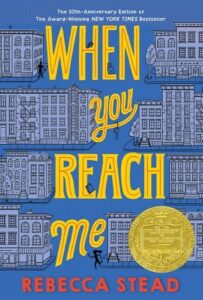
Rebecca Stead's 2009 Newberry Medal winning, When You Reach Me, tells the story of eleven-year-old Miranda and her single mother, living in an apartment in New York City in 1978, the year Miranda's mother practices for her upcoming appearance on the $20,000 pyramid and Miranda begins receiving anonymous, mysterious notes. Early in the novel, Miranda explains: "[I]t's because I never had a father that I don't want one now. A person can't miss something she never had."
I read the novel to Indie the year it was published, several chapters at each bedtime. Indie was seven that year—the two of us riveted by the story's mystery, but mostly drawn to reading about a relationship and a life like ours—a mother stealing supplies from work to cut costs; the way Miranda doesn't "see" the barrenness of her home until she's the homes of her friends; the ways they look out for each other. Late in the novel, after Miranda befriends a homeless man (something Indie did at the age of five) by giving him a sandwich, her mother "blows up" at her. And moments later, she comes to Mira's room to apologize:
"I don't want to make any more mistakes. I don't think I can bear to make one more mistake." When Miranda asks, "What mistakes?" Her mother laughs, "Are you kidding? Where should I start? I've made about a million mistakes. Luckily, you outweigh almost all of them."
I look back at so many of the years that Indie and I struggled financially or with the fact that my position was temporary, and we'd have to move. Again. The nights I blew up in the living room, not at her but at the world, a night she claims not to remember, though there were other times I yelled that she does. Regret will always have a place at the table of any parent's memories of raising a child. As Miranda says, "Trying to forget doesn't work. In fact, it's pretty much the same as remembering."
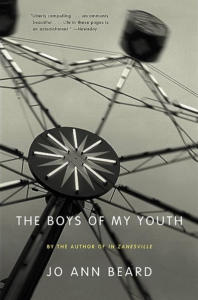
While the focus of Beard's seminal essay collection Boys of My Youth does not solely focus on mothers and daughters, Beard's mother shines in the first half of the collection. In the preface, Beard recalls a pre-verbal memory—a night in her crib when she cried and cried and could not be consoled by her parents. Years later, when she asks her mother to confirm her memory, as many essayists do with the people we write about, her mother answers: "I don't remember a night that wasn't like that."
Beard's affection and admiration for her mother, as a young girl to an adolescent and eventually adulthood rings through Beard's descriptions—the mother who's smoked the same cigarette for thirty years, (Salem)' the one who tells her sister, "We got our girls we wanted so bad, didn't we?"; the one who can end an evening's fun with one word—bath; the mother who hangs Hal, Beard's doll, upside down on the clothesline after an bath time experiment gone awry; the mother who runs to rescue her daughter from a bike accident on a street she wasn't supposed to be on; and the daughter, the daughter who brings a prescription bottle full of safety pins to the mortuary so that her mother's pale gray wool suit and pink blouse fit.
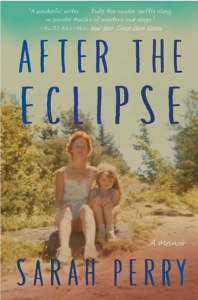
The opening chapter of Sarah Perry's After the Eclipse: A Memoir begins, "I want to tell you about my mother." The memoir alternates between chapters labeled "before" and "after," a reference to the night Perry's mother was murdered in their home as young Sarah, only twelve, hid in her bedroom. The memoir subverts the true crime genre by focusing on the life of the victim, rather than the perpetrator or the details of the crime—casting a glow on the relationship between Perry and her single mother. In the first chapter, across six pages, Perry explains:
My mother was full of energy and passion. She believed in the soul of housecats and in the melancholy of rainy days. She believed in hard work, and the energy she poured into her job—hand-sewing shoes at a factory—seemed boundless . . . She was graced with bright red hair, a golden tone of red I've seen only a handful of times....In the short Maine summer, she sunbathed for hours . . we would drive to the ocean just south of Portland. Her favorite thing to collect from the beach was sand dollars, and I loved walking up and down the yellow sand and finding them for her....The clicking of her high heels on our kitchen flow meant happiness to me. . . In her romantic selections, she could have done better, and she could have done worse. She was often imperfect in her own love....Because of her, I will always believe love is possible.
When we write about those we have lost, we have to show readers what has been lost, and Perry's memoir achieves this in a way that drew out an ache in my chest as I read it through her elegant elegy, not only to her mother, but to the loss of beach walks and car dancing, shared salon visits and sunbathing, the living and the laughter once shared by mother and daughter.
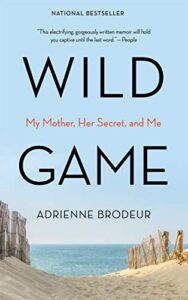
During the first year that Indie was gone, her first year of college, I read Adrienne Brodeur's Wild Game: My Mother, Her Secret, and Me. It's a mesmerizing portrait of Brodeur's mother—a vivacious woman with allure and an affinity for creating feasts "whose aromas alone would entice ships full of men onto the rocks, where she would delight in watching them plumb into the abyss," identifying her mother as akin to the Sirens of Greek mythology.
The memoir begins on a night when Brodeur's parents host a cocktail hour and dinner with her father's best friend and his wife, a night that ends when Brodeur's mother wakes her daughter, then fourteen, to confide in what would be the beginning of an affair. With this confession, Brodeur's mother turns her daughter into a confidante, one who helps to orchestrate the ongoing affair for years. When Brodeur's own daughter turns fourteen, she realizes, "[T]here is something noxious in our matrilineal line. [My mother] was the only mother I had, but she was not the mother I wanted to be....There had to be another way and I owed it to my daughter to find it."
When I finished the memoir, I told Indie about it during one of our Zoom visits, explaining how it reminded me of us, especially the ending. A few weeks later, Indie read it, crying at the end as I had, once again recognizing the two of us on the page in someone else's story:
My daughter is almost fourteen—the age I was when my mother woke me to tell me about Ben's kiss. And although she and I bear a strong resemblance to each other—bone structure, build, coloring—my daughter is fully herself. She and her grandmother have always had a special bond, one that is pure.
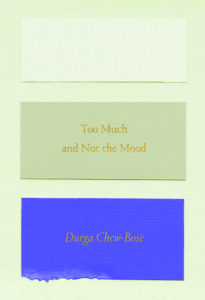
Durga Chew-Bose's debut essay collection, Too Much and Not the Mood, takes its title from a line in Virginia Woolf's dairy, a bold reference that Chew-Bose's essays deserve. The essays—contemplative, interrogations of the self and memory—range from ninety-three pages in the opening essay to two pages. They are form-forward essays, as Chew-Bose relies on intricate braiding or collage or enumerated pieces, even an essay in the third person, an objective presentation of the self.
Chew-Bose, at twenty-eight in the essays, lives alone, walks to movies alone, thinks about writing, about a vacuum cord winding along a library floor, about advice her mother gives her in the car one day: "People don't change," and Chew-Bose spends pages speculating about their possible meaning. What the persona in these essays never has to wonder about is her mother's love for her and in turn, her love for her mother.
A few weeks later, Indie read it, crying at the end as I had, once again recognizing the two of us on the page in someone else's story.
Chew-Bose describes her "beautiful mother" growing out her gray, wearing a rotation of t-shirts when she's cooking, doing things in time—"wonderfully exonerative time—peel[ing] two clementines and [making] a cup of tea before unpacking her groceries," and being nourished by "replenishing ease." Looking back at her childhood, a time after her parents' separation, she understands how she was she was too young to notice that her mother bought a new shade of lipstick, Brick, which she still wears today or how angry and rude she was toward any man near her mother, but she remembers the cool touch of her mother's palm on her forehead before bed, a mother whose love "has never been—not once—hesitant."
In the last essay of the collection, Chew-Bose sits on the front porch of her parents' home, listening to the sounds of her mother and father inside cooking dinner—utensils slide in a drawer, the fridge opens and closes. It's these kinds of quotidian moments that drive Chew-Bose collection and convey, again and again: "This is love; it lives in the practical details."
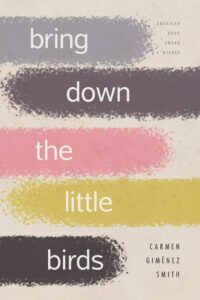
In Bring Down the Little Birds: On Mothers, Art, Work, and Everything Else, a lyrical memoir-in-fragments, Carmen Giménez Smith writes about the moment she learned that her second child is a girl: "Daughter, I whisper to myself. Daughter." She begins to speculate:
I will infuriate her. She'll resist the sweaters I pick for her. Often she won't' take my calls. She'll date blond boys of whom I disapprove, wild girls of whom I disapprove. She'll make an effigy of my disappoint and she'll marry it. She'll be me and I'll hate it.
I will laugh with her at the lady with the dog next door. I will talk to her three days times a day about nothing. She will send me pictures of boyfriends, of girlfriends. She will ask me eagerly, What do you think?
Giménez Smith illuminates the difficulties of being a mother, an artist, a professor, and daughter of an ailing mother—offering realizations and epiphanies that any parent (or person) will recognize, "I was sandwiched between who I was and who I must be." As a new mother, Giménez Smith looks to her own mother's example of motherhood as a guide as she wonders, "She had given herself over entirely, but who knows what her dreams were, really?"
______________________________

The Last Year by Jill Talbot is available via Wandering Aengus Press.
No comments:
Post a Comment